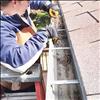Winemaking
Polson friends turn hobby into business
Hey savvy news reader! Thanks for choosing local.
You are now reading
1 of 3 free articles.
Grinde Bay Winery began with three men in a garage, and now one of the winery’s first vintages will be named just that: Three Men in a Garage 2010 Cabernet Sauvignon.
The three men are Gary Rice, winemaker and owner, and his friends Mac Swan and John Winegart, production and marketing specialists. The garage belonged to Rice, and the friends made non-commercial wine in it for several years, using a basket press idea that came from Rice’s grandfather.
Winemaking has been a Rice family tradition since his grandparents emigrated from Czechoslovakia and started a vineyard in Michigan. Selling most of their grapes to Welch’s, Rice’s grandparents also sold grapes to local wineries and pressed some of their own wine. Rice’s father also made wine, and Rice always wanted to produce wine.
“One cold winter day I decided to buy some wine making books. I read up on it and started making wine the next fall,” Rice remembered.
Right now Grinde Bay Winery is making Merlot, Cabernet Sauvignon and Syrah and planning to do some whites, Rice said. They want to make more Chardonnay and a Riesling.
To get the main ingredient for wine, Rice drove his pickup and trailer to the Columbia Valley in Washington. Returning with bins full of grapes, Rice and his friends used a forklift with a side dump to transfer the fruit to a hopper and then onto an elevator to get them into the winery.
Then the grapes went through the destemmer, two fermentations and three filtrations. The wine is piped throughout the winery in yards and yards of clear hose.
Stems and the pressed grape skins went to the compost pile at the landfill. The first press was so efficient, Rice said, that the grape skins were not moist to the touch.
As a winemaker, Rice believes a malolactic ferment “makes the wine taste better, less harsh.” After that fermentation, the wine is filtered again, and then pumped into oak barrels, for oak tannins, and aged before it’s bottled.
Grinde Bay Winery has a new bottling machine, just set up over Christmas by Rice and his son Tyler, an engineering student at Montana State University. Tyler was Rice’s main worker before he went off to college and is enthusiastic about winemaking.
The winery also has a new plate and frame filtration machine.
An attorney, Rice splits his time between practicing law and making wine.
“Winemaking allows me to do that,” he said.
Comparing winemaking to growing alfalfa, Rice said he and his friends put in 16-hour days at the beginning of the process, but then it’s “watching the alfalfa grow.” With winemaking as with farming, there is always something to do — repairing equipment when it’s not being used, topping off barrels of wine, punching down the “cap” of grape skins during the ferment, cleaning hoses and equipment, setting up new equipment, and working with bottling equipment.
“You have to be a mechanic,” Rice said, indicating the array of machines in the building.
One improvement Rice wants to make is upgrading the quality of grapes he buys. By consulting a friend who owns a winery in Sandpoint, Ida. and who has extensive winemaking experience in France and California, Rice buys grapes from the best vineyards in the Columbia Valley. Since Grinde Bay Winery is small, Rice can buy all handpicked grapes. Even though it costs more, handpicking eliminates poor quality fruit and results in less debris, like leaves.
Parts of the winemaking process Rice particularly enjoys are walking into the winery and smelling the grapes being fermented, “a really cool smell,” and hearing the bubbles when the yeast is fermenting.
The Grinde Bay Winery business model is to make premium wines, Rice explained, but the goal is to keep the winery small enough to keep it fun.















